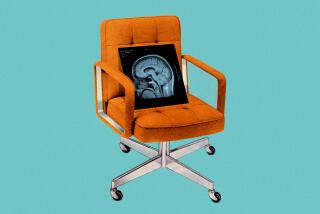Brain-Injured Can Spot Lies, Study Says
- Share via
BOSTON — Some brain-injury victims who lose the ability to understand speech develop a talent that could come in handy during an election year: an uncanny ability to tell when someone is lying.
Neurologists realized decades ago that people who suffer a stroke or other trauma to the speech-recognition region in the brain’s left hemisphere seem adept at spotting liars by reading facial expressions.
In his 1985 bestseller, “The Man Who Mistook His Wife for a Hat,” neurologist Oliver Sacks recalls watching a ward full of such patients laughing uproariously while watching a televised address by President Reagan. They were picking up on lies amid the Great Communicator’s smiles, Sacks writes.
Now scientists have experimental proof of Sacks’ observation.
“They’re picking up nuances of facial expression, a momentary expression that flashes by quickly in the presence of a masking smile, a fake smile. They’re picking up on these leaks of emotions,” said Nancy Etcoff, a psychologist at Massachusetts General Hospital who led a study published in today’s issue of the journal Nature.
The study involved brain-injury patients with aphasia. Often, other people’s words are little more than gibberish to aphasics.
The patients in the study could not understand full sentences delivered at conversational speed but could comprehend single words and simplified speech like that used to communicate with a child. All could express themselves to various degrees and could read and write.
The researchers showed 10 such patients videos in which women described watching pleasant scenes such as a tropical sunset.
Each woman made two videos. In one version, she was actually viewing a relaxing scene on a TV screen and commenting on its beauty. But in the other version, she had to lie about what she was seeing because she was actually watching ghastly images of burn victims and amputees.
The aphasic patients used agreed-upon signals such as raising a hand to indicate when they thought the woman was lying.
Non-aphasics had only about a 50-50 chance of spotting when the woman was lying. But the aphasics spotted the liar 73% of the time, showing the kind of skill that could make for expert poker players or police interrogators.
“People have told me, ‘These patients should be on juries or in customs lines at the airport.’ There’s been a lot of jesting,” Etcoff said.
Dr. Elliott Ross, a professor of neurology at the University of Oklahoma, said it is the first study in a major scientific publication to demonstrate clearly that aphasics can sense deceit in speakers.
“It shows very nicely that when you have damage to the left side of the brain you increase your ability to capture deceitful behaviors. It’s really breaking new ground,” he said.






